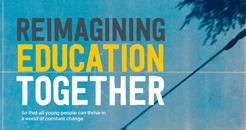 Reimagining Education Together
Reimagining Education Together
From a report by Big Change
Big Change & Innovation Unit have released 'Reimagining Education Together' which began with a recognition that change was needed, but an open enquiry into how it could happen.
They deliberately sought out a wide range of opinions and expertise from teachers, policy experts, employers, technologists, neuroscientists, parents and young people from around the world. They found a growing consensus that in order to support all young people to thrive in a world of constant change, we needed to think differently about what we are educating for and how we are going about it.
If we are to truly prepare young people for life, work and citizenship in the modern world we need both a broader view of success and a broader view of the learning ecosystem.
As they learned a lot about what ‘big change’ means and how it happens, here are five key lessons they’ve taken away:
1. When the world is changing, education needs to change too.
We live in an interconnected, rapidly changing world and education needs to reflect that. Employers increasingly ask for ‘essential skills’ such as communication and collaborative problem solving and this trend is only going to continue. Massive economic bodies like OECD and WEF have highlighted the need for humans to develop the skills that machines don’t have in the coming years. Life skills such as communication, empathy, resilience.
2. Ordinary people want education to change.
The research showed that teachers, parents and students believe that school in England is focused on preparing young people for exams, but they actually wish it had broader aims. Parents and students highlighted their desire to learn skills for work, life skills and better communication skills. 87% of teachers want to make a positive difference to society. These desires match pretty closely to the kind of education championed by the expert organisations we spoke to.
3. Change isn’t someone else’s problem.
If we want broader education outcomes then everyone needs to think about their role in helping that to happen. When they say in the report that education is everyone’s business, they mean that each of us needs to use the resources we each have available to help. For example if a business wants employees with better problem-solving skills, then how can they connect with schools to help that happen?
We can and we should support schools and teachers to work with communities to make change, but at a time when teachers are leaving the profession, we can’t ask schools to bear full responsibility for every aspect of our children’s learning and development. We have to get involved.
4. Change can come from anywhere.
Their pioneer stories show that the process of educational change can be initiated by anyone with a vision and a willingness to work with others. They spoke to teachers creating design tools and a community to help other educators become agents of change in their schools, parents leading national campaigns to challenge standardised testing, students in Sub-Saharan Africa building alumni networks to support female education, and even governments that were brave enough to take a long-term view of education and start a national conversation about what learning means to their society.
5. Change is a human story
Perhaps the biggest message they took away from this process is that change is human. It starts with bringing people together, creating relationships where they didn’t exist before, building trust, sharing stories, working together and keeping going when we get it wrong.
What we mean when we talk about changing systems, is changing people, their minds and behaviours, starting with ourselves.
The limitations and symptoms of a struggling education system have been felt in all sections of society by employers, parents, students, educators, policy makers and charities. The message of Reimagining Education Together is that these issues can be addressed but only when each of these stakeholders becomes involved in the change.
Pioneers from New Zealand to Delhi to Ghana to Louisiana showed that change is a human and relationship driven process. It requires empathy, a mindset that is open to possibility and resilient to challenge; exactly the kind of human competencies that we hope to teach young people.
Powerful learning environments constantly create synergies and find new ways to enhance professional, social and cultural capital with others. They do that with families and communities, with higher education, with other schools and learning environments, and with businesses. That is why we
need to make education everybody’s business and our shared responsibility.
We are all part of a learning ecosystem and we must all play our part in shaping it – from building a new common sense of what education is for, to connecting our communities to schools. This is a liberating vision of change. We don’t have to wait for permission. We can start reimagining education together, right now.
Leading thinker, best selling author and friend of Big Change, Simon Sinek shares his thoughts on the future of education - the change that's needed and the change that is possible in this 5 minute video:
Download the report from here.
Retweet about this article:
From a report by Big Change, 25/09/2019